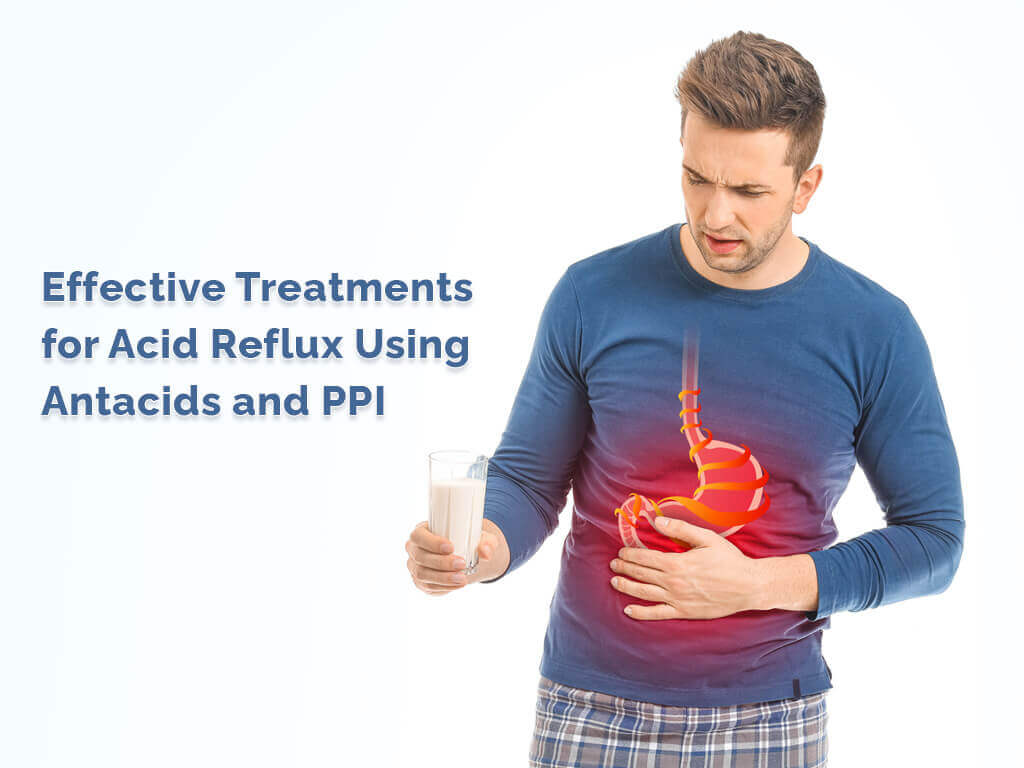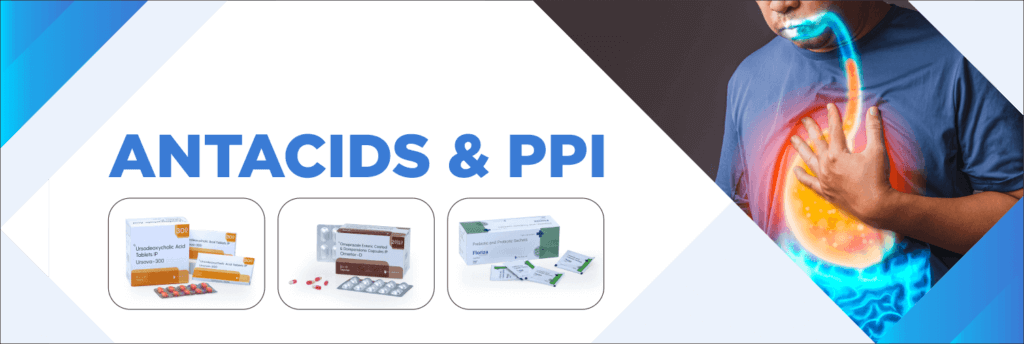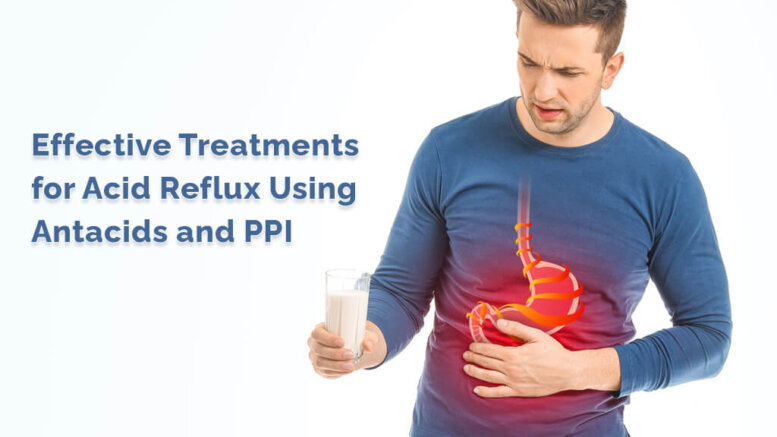The Most Effective Treatments for Acid Reflux Using Antacids and PPI
Gastroesophageal reflux disease (GERD) is a condition in which acid reflux using Antacids and PPI from the stomach flows back into the oesophagus, irritating the lining. Symptoms include chest pain, burning, regurgitation of food into the mouth, and difficulty swallowing. Despite the fact that this disorder can be painful and irritating, it is manageable. This is accomplished through the use of over-the-counter medications or prescription medications prescribed by your gastroenterologist. This is in addition to modifying one’s lifestyle. The following are some of the most effective treatments for symptom management and discomfort.

Over-the-counter medications:
- Antacids-These medications, which include Mylanta, Tums, and Rolaids, help to neutralise stomach acid reflux using Antacids and PPI supplier in Ahmedabad. They are one of the first treatments that are suggested. They provide immediate relief, but they do not heal the oesophagus if the lining is damaged. Overuse of certain medications, particularly those containing aluminium and magnesium, can result in diarrhoea or chronic kidney disease.
- H-2 Receptor Blockers- These medications work by reducing the amount of acid reflux using Antacids and PPI produced in the stomach. They do not work as quickly as antacids, but they provide relief for up to 12 hours. Pepcid AC, Tagamet HB, Zantac, and Axid AR are a few examples.
- Proton Pump Inhibitors- This class of medications inhibits the production of acid reflux using Antacids and PPI PCD pharma franchise Ahmedabad. It also aids in the healing of any esophageal lining damage. Prevacid, Prilosec, and Zegerid are examples of H-2 receptor blockers that are far more potent than H-2 receptor blockers.
Prescription-strength medications:
- H-2 Receptor Blocker s- These are prescription-only versions of the over-the-counter drugs Pepcid, Axid, and Zantac. Although most people have no issues with them, long-term use can result in vitamin B12 deficiency. In addition, there is an increased risk of bone fractures.
- Proton Pump Inhibitors (PPI) – This is the prescription-strength version, just like the H-2 receptor blockers. Prevacid, Prilosec, Zegerid, and Protonix are among the medications included. The use of these medications on a regular basis can result in diarrhoea and nausea. This is in addition to a lack of vitamin B12 and an increased risk of bone fractures.
- Baclofen – This medication works to strengthen the lower esophageal sphincter muscle; however, some people experience nausea and fatigue as a side effect.
Antacid Treatment for GERD
GERD (gastroesophageal reflux disease) is a type of heartburn that occurs on a regular basis. When stomach acids leak back up into the esophagus, this condition occurs. This causes potentially harmful inflammation or swelling over time.
While many people experience the pain and irritability associated with heartburn on occasion, you may have GERD if these symptoms occur more than twice a week on a regular basis. The consequences of this digestive disease can be severe because it can cause esophageal damage over time.
In most cases, your primary care physician can diagnose and treat GERD. When the condition is severe or does not respond to first-line medication, you may need to see a gastroenterologist, a type of doctor who specializes in digestive diseases. The treatment consists of a combination of dietary changes and medications. Because they are readily available over the counter, acid reflux medicine using Antacids and PPI segments is usually the first line of defense. They may also be less expensive than prescription medications. Inform your doctor if you experience heartburn symptoms on a regular basis.

How Antacids Help GERD
Antacids are fast-acting pain relievers that work by directly counteracting the acidity in your stomach. The presence of these acid reflux using the best Antacids and PPI wholesalers in the stomach is normal because they aid in the digestion of food. The stomach is the only part of your digestive tract that is built to withstand low pH levels. When stomach contents back up into the esophagus, it causes heartburn because the esophagus is not designed to withstand acidity, especially over time. Antacids help to neutralize these acids, exposing the esophageal lining to less gastric acid.
The following ingredients are found in the majority of antacids:
- aluminum hydroxide
- calcium carbonate
- magnesium trisilicate
Liquid versions are more efficient. There are also more convenient options, such as tablets and gum.
Traditional acid reflux using Antacids and PPI are easy to obtain because they are available without a prescription. Some of the most well-known brand names are:
- Gaviscon
- Gelusil
- Maalox
- Mylanta
- Riopan
- Rolaids
- Tums
Antacids are intended to provide immediate relief from GERD symptoms; however, they do not prevent these symptoms. Other medications, such as H2 blockers or PPIs (proton pump inhibitors), can be used to prevent heart disease.
PPIs Treatment for GERD
Gastroesophageal reflux disease (GERD) is typically treated in three stages. The first two stages involve taking medications and changing one’s diet and lifestyle. Surgery is the third stage. Surgery is usually reserved as a last resort in the most severe cases of GERD with complications.
The majority of people will benefit from early-stage treatments by changing how, when, and what they eat. However, for some people, diet and lifestyle changes may not be enough. In these cases, doctors may advise patients to take medications that reduce or eliminate acid reflux using Antacids and PPI production in the stomach.
One type of medication that can be used to reduce stomach acid and relieve GERD symptoms is proton pump inhibitors (PPIs). H2 receptor blockers, such as famotidine (Pepcid AC) and cimetidine, are other medications that can be used to treat excess stomach acid reflux using Antacids and PPI(Tagamet). PPIs, on the other hand, are typically more effective than H2 receptor blockers and can alleviate symptoms in the vast majority of GERD patients.
How Do PPIs Work?
PPIs work by inhibiting and reducing stomach acid reflux using Antacids and PPI production. This allows time for any damaged esophageal tissue to heal. PPIs also help to prevent heartburn, which is a common symptom of GERD. Because even a small amount of acid can cause significant symptoms, PPIs are one of the most powerful medications for relieving GERD symptoms.
Over a four to twelve-week period, PPIs aid in the reduction of stomach acid reflux using Antacids and PPI. This amount of time allows for proper esophageal tissue healing. A PPI may take longer to relieve your symptoms than an H2 receptor blocker, which usually begins reducing stomach acid within one hour. PPIs, on the other hand, provide longer-lasting symptom relief. As a result, PPI medications are usually the best choice for people who have GERD.

